The 2010 LCGC Pittcon Awards
LCGC North America
The winners of LCGC's third annual awards were announced at Pittcon 2010.
Now in its third year, the LCGC Awards have quickly grown into one of the industry's premier honors for both emerging and veteran practitioners of chromatography. In this relatively short timeframe, the awards have built a prestigious list of awardees from all over the field and from a variety of different specialty areas, and this year in particular, generated a great deal of interest from all across the field of chromatography.

(THINKSTOCK/GETTY IMAGES)
With previous Lifetime Achievement Awards going to such illustrious figures as Walt Jennings, formerly of J&W Scientific (2008) and Harold McNair, Virginia Tech (2009), and with Emerging Leader Awards going to well known experts Gert Desmet, Free University of Brussels (2008) and Kevin Schug, University of Texas, Arlington (2009), the prestige associated with these awards has become well established very early on, and this year's awards were no different.
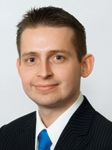
Jared Anderson University of Toledo
Presented in conjunction with Pittcon 2010 at the Orange County Convention Center on March 1 at a 1 P.M. press conference, the LCGC Awards this year honored one of the industry's giants in Lifetime Achievement Award winner Georges Guiochon, University of Tennessee, Knoxville, and one of the industry's brightest stars, Jared Anderson, University of Toledo.
Lifetime Achievement Award
To those who have spent any amount of time in the field of chromatography, Dr. Guiochon needs no introduction, and his educational background reads like a "Who's Who" of venerable scientific institutions. He received the M.S. degree in engineering from the Ecole Polytechnique, Paris, France, and the Ph.D. in chemistry from the University of Paris. He was a Professor of chemistry at Ecole Polytechnique until 1985 and at the University of Paris VI or Universite Pierre et Marie Curie until 1984. He then moved on to Georgetown University, Washington, DC, from 1984 to 1987, and he was appointed a UTK/ORNL Distinguished Scientist in June 1987. He is currently a Distinguished Professor with the Department of Chemistry, University of Tennessee, Knoxville, and is a Senior Scientist with the Oak Ridge National Laboratory's Division of Chemical and Analytical Sciences, Oak Ridge, Tennessee.
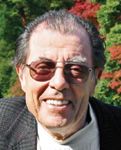
Georges Guiochon University of Tennessee, Knoxville
His research interests include all aspects of gas and liquid chromatography, theory, instrumentation, and applications, and the problems of physical chemistry related to chromatography. These include solution and adsorption thermodynamics, mass and energy transfers, detector principles, and the consolidation of beds of fine particles. His current work is in the theory of nonlinear chromatography, the development of separation processes based upon chromatography (including simulated moving bed [SMB]), and the preparation of efficient columns. He has nearly 800 scientific publications to his name, and his most recent books are Quantitative Gas Chromatography, written in cooperation with C. Guillemin, and Fundamentals of Preparative and Nonlinear Chromatography, written in cooperation with S. G. Shirazi and A. M. Katti.
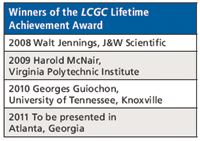
Winners of the LCGC Lifetime Achievement Award
Dr. Merlin Bicking, ACCTA, Inc. (St. Paul, Minnesota) said of Dr. Guiochon: "I was first introduced to Georges Guiochon through his contribution in Csaba Horvath's High-Performance Liquid Chromatography series in 1980. I was impressed with the mathematical rigor that he employed, but also with his ability to translate those equations into meaningful insights about the chromatographic experiment. His work has continued to explore the limits of chromatography, and has certainly helped us to extend those limits well beyond what was imagined just 30 years ago."
Dr. Guiochon's previous awards and honors also read like a litany of the industry's most respected institutes and societies. He is an Honorary Member of the Chromatographic Society of the UK, of GAMS (the French Society of analytical chemistry), and of the Spanish Royal Society of Physics and Chemistry. He was awarded the 1978 Silver Medal of C.N.R.S. (the French NSF, and was the winner of the 1978 Dal Nogare Award of the Chromatography Forum of Delaware Valley; the winner of the Tswett Medal for Advances in Chromatography; the winner of the Tsvet Medal of the Russian Academy of Sciences; and the winner of the 1980 A.J.P. Martin Award of the Chromatographic Society. He has received honorary doctorates from the Technical University of Budapest, Hungary (1991), the University of Pardubice, Czech Republic (1999); and the University Ramon Llull, Barcelona, Spain (2002). He also received the 1991 Separation Sciences Award and the 1998 Chromatography Award of the American Chemical Society; the 2001 Eastern Analytical Symposium Award in Separation Sciences; the Placo de Honor of the Spanish Research Council (2002); and the 2002 Research Award of CASSS. In 1994, he received an Alexander von Humboldt Award as a Senior American Scientist. In addition, he also spent nine months in 1994–1995 working in the Institut für Organische Chemie of the University of Tübingen, Germany.

(JEREMY WOODHOUSE/GETTY IMAGES)
In short, Dr. Guichon is more than a worthy recipient of the 2010 LCGC Lifetime Achievement Award, and LCGC is honored to count him among its award winners.
Speaking on behalf of Dr. Guiochon was the aforementioned Merlin Bicking, a well-known figure in the field of chromatography as well, managing ACCTA, contributing to numerous issues of LCGC North America, and recently, heading up efforts to expand the reach of the chromatographic sciences to African universities and institutes. His organization, in collaboration with the School of Physical Sciences, University of Nairobi, plans to hold the 2nd Annual East African Chromatography Training Seminars at the University of Nairobi, Nairobi, Kenya, in March 2010.
Emerging Leader Award
Jared Anderson of the University of Toledo, Toledo, Ohio, is a name that readers will be familiar with in the very near future, if they are not already. And if the accolades heaped upon him from colleagues is any indication, his name may be familiar to readers even sooner. One colleague had this to say of Dr. Anderson: "[He] has been highly productive, demonstrated outstanding creativity and innovation in his research, and contributed significant new approaches to the field of separations science during his young career."

(PURESTOCK/GETTY IMAGES)
A 2000 recipient of the B.S. degree in chemistry from South Dakota State University, Brookings, South Dakota (certified by the American Chemical Society), Dr. Anderson went on to receive the Ph.D. degree in analytical chemistry in 2005 from Iowa State University, Ames, Iowa, with well-known expert (and LCGC Editorial Advisory Board member) Daniel W. Armstrong acting as his advisor. His dissertation title was "Ionic Liquids: Synthesis, Solvation Interactions, Chromatographic Characteristics, and Micelle Formation." He was an Assistant Professor with the Department of Chemistry, University of Toledo, from 2005 to 2009 before he became an associate professor with tenure in 2009, a position he currently holds.
His research interests currently include the synthesis, development, and characterization of room temperature ionic liquids; uses of ionic liquids as novel media in chromatography and analytical extractions; all aspects of separation science; and applications of ionic liquids in membranes and biomass. The honors he has received in a relatively short amount of time speak volumes about Dr. Anderson's record of achievement. He received the Outstanding Undergraduate Award in Organic Chemistry in 1997; the Dobberstein Undergraduate Research Award in 1999; the HyperCube Scholar Award in 1999; the American Institute of Chemists Undergraduate Award in Chemistry in 2000; the Herbert H. Hodgeson Award in Chemistry in 2000; the South Dakota State University Schultz-Werth Undergraduate Research Award in 2000; the Iowa State University Teaching Excellence Award in 2001; the Velmer and Mary K. Fassel Fellowship Award in Analytical Chemistry in 2003; the Fassel Travel Award in 2004; the Alpha Chi Sigma Award for Research Excellence in 2005; the NSF Faculty Early CAREER Award in 2008; and the Evangelos Theodosiou/Sigma Xi Young Faculty Research Award in 2008. He was a Plagens Graduate Student Mentor Award in 2004–2005 and received honorable mention for the Daniel Zaffarano Prize for Graduate Student Research, Iowa State University, in 2005.
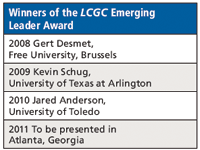
Winners of the LCGC Emerging Leader Award
Dozens of peer-reviewed articles and five U.S. patents round out what is certainly one of the most impressive entries into the Emerging Leader Award competition in recent memory.
Speaking on behalf of Dr. Anderson was Dr. Jon R. Kirchhoff, Professor and Associate Chair with the University of Toledo, who is himself a decorated member of the separation science community, having received numerous awards and honors in his career. Among them are the Dean's Merit Award of the University of Toledo in 1993, 1994, 1996, and 1998, a faculty research fellowship from the University of Toledo in 1990, 1991, 1993, 1995, and 1997, and the David Ross Summer Research Fellowship at Purdue University, West Lafayette in 1980.
The Role of Previous Winners
Previous LCGC Award winners have played a critical role in the various publications and projects produced under the LCGC brand. Previous Lifetime Achievement Award winners Walt Jennings and Harold McNair have both written installments of LCGC's "History of Chromatography" column (1,2), with Dr. Jennings writing an heartfelt description of his time in the field of chromatography that went beyond the science to describe many of the people and places that have been important to him. Dr. McNair wrote a similar installment in which he took a more amusing approach to his description of the old days of gas chromatography. Both have remained active in LCGC's peer review process and in advisory capacities generally.
The Emerging Leader Award winners have played an important role as well, as Gert Desmet wrote an insightful installment of Ron Majors' popular "Column Watch" column (3), in which he compared column techniques to optimize high performance liquid chromatography column performance. Last year's winner, Kevin Schug, has perhaps taken on the greatest role within LCGC, signing on to act as the LC Department Dean in LCGC's "CHROMAcademy." Dr. Schug has provided a wealth of insights and has added critical ideas. recommendations, and guidance during the design and launch of this innovative new e-learning site.
In summary, you can expect to be hearing a lot from this year's award winners in the future, as they will certainly be invited to take leadership roles on LCGC as well.
Conclusion
Finally, the staff of LCGC would like to extend their warmest and most heartfelt congratulations to all of this year's winners. LCGC is pleased and honored to extend these awards and looks forward to working with 2010's winners on many future projects.
References
(1) W. Jennings, LCGC 26(7), 626–631 (2008).
(2) H. McNair, LCGC 28(2), 138–145 (2010).
(3) G. Desmet, LCGC 26(6), 514–531 (2008).
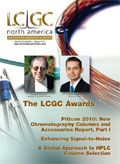
University of Rouen-Normandy Scientists Explore Eco-Friendly Sampling Approach for GC-HRMS
April 17th 2025Root exudates—substances secreted by living plant roots—are challenging to sample, as they are typically extracted using artificial devices and can vary widely in both quantity and composition across plant species.
Sorbonne Researchers Develop Miniaturized GC Detector for VOC Analysis
April 16th 2025A team of scientists from the Paris university developed and optimized MAVERIC, a miniaturized and autonomous gas chromatography (GC) system coupled to a nano-gravimetric detector (NGD) based on a NEMS (nano-electromechanical-system) resonator.
Miniaturized GC–MS Method for BVOC Analysis of Spanish Trees
April 16th 2025University of Valladolid scientists used a miniaturized method for analyzing biogenic volatile organic compounds (BVOCs) emitted by tree species, using headspace solid-phase microextraction coupled with gas chromatography and quadrupole time-of-flight mass spectrometry (HS-SPME-GC–QTOF-MS) has been developed.
Common Challenges in Nitrosamine Analysis: An LCGC International Peer Exchange
April 15th 2025A recent roundtable discussion featuring Aloka Srinivasan of Raaha, Mayank Bhanti of the United States Pharmacopeia (USP), and Amber Burch of Purisys discussed the challenges surrounding nitrosamine analysis in pharmaceuticals.











